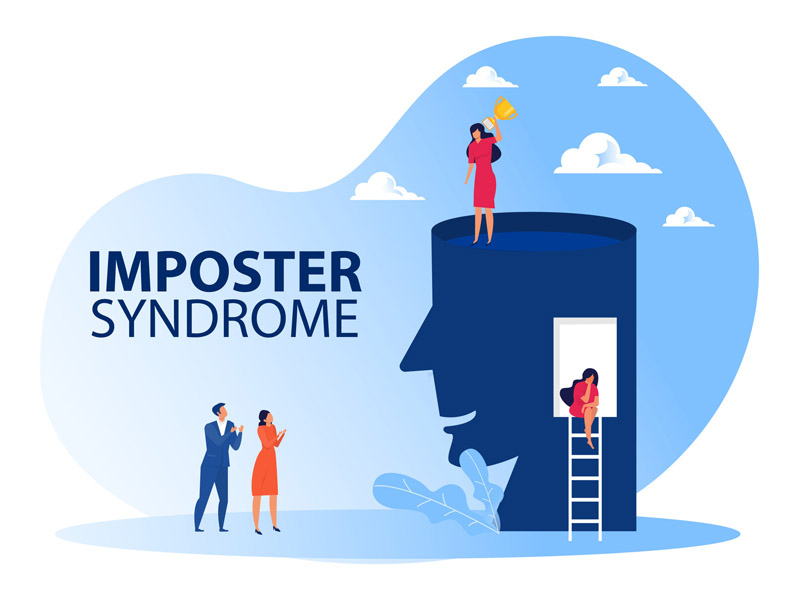New CME Helps Family Physicians Fight Imposter Syndrome
July 19, 2021, 1:59 p.m. Michael Devitt — As part of its ongoing commitment to improve the health and well-being of family physicians, the AAFP this month unveiled a new activity in the Physician Well-Being CME series, “Overcoming Imposter Syndrome,” exclusively for AAFP members.

“Our patients deserve family physicians who feel safe and supported bringing their whole selves to their work caring for our communities,” said Margot Savoy, M.D., M.P.H., the Academy’s senior vice president for education. “You can’t do that effectively if you are distracted by imposter syndrome.
“This course is a first step in helping our AAFP members begin this important work. I think all family doctors would benefit from exploring the course even if they don’t believe they have imposter syndrome. It is a great opportunity for us all to learn how we can create a welcoming environment and support our colleagues.”
Imposter syndrome, according to the Harvard Business Review, can be described as a collection of feelings of inadequacy that persist despite overwhelming evidence of success. While it does not indicate low self-esteem or a lack of self-confidence, it is often caused by chronic self-doubt and an inability for people to internalize their own accomplishments.
Results from a small pilot study of American medical students published in 2016 found that imposter syndrome is nearly twice as likely to affect those who identify as female compared with those who identify as male. The study also found that imposter syndrome was more likely to affect individuals who identified as Black, Hispanic, Native American or multiracial compared with those who identified as white or Asian. It has also been suggested that imposter syndrome may directly impact patient care by increasing burnout and making it more difficult for health care professionals to express empathy or pursue more challenging roles.
Story Highlights
Content
The new activity was developed in collaboration with the AAFP’s Center for Diversity and Health Equity, and aims to provide additional support for family physicians who are underrepresented in medicine. The program runs approximately two hours and consists of
- a presentation on imposter syndrome by Rodney Smith, Ed.D., vice president for access and engagement at William Jewell College in Liberty, Mo., and a graduate adjunct professor in the School of Education at the University of Missouri-Kansas City; and Stephanie Smith, M.S.W., a co-founder with Smith and managing partner of Sophic Solutions, L.L.C., a change management and consulting firm; and
- “lived experience” interviews with the Smiths and family physicians Chrysta Chatman, M.D., medical director at the Unity Health Care-Parkside Clinic, in Washington, D.C.; Monique Sessler, M.D., an AAFP health equity fellow and medical director at Family Care of Williamsburg in Williamsburg, Va.; and Emily Lenherr, M.D., a resident at SCL Health/St. Mary’s Medical Center Family Medicine Residency in Grand Junction, Colo.
The opening presentation provides a comprehensive introduction to imposter syndrome, including a definition of the condition, symptoms, sources and tips on how to overcome it.
In each interview, meanwhile, FPs share their personal stories of dealing with and overcoming imposter syndrome. Following each interview, participants will have the opportunity to complete reflection exercises and email their responses for later use. Each interview also contains links to resources on imposter syndrome.
Stephanie Mueller, a CME program strategist with the Academy, said the interview sessions reflect the feelings and perceptions of other FPs practicing in the field.
“Family physicians need to understand that this experience is not unique, and they are not alone,” said Mueller. “The feelings of imposter syndrome affect individuals with all types of experiences and backgrounds, especially those in marginalized groups.
“Members will take away strategies they can use to defuse imposter syndrome when it creeps up and address the cultural microaggressions that contribute to this phenomenon.”
After completing the activity, members should be able to
- explain the impact of imposter syndrome on family physicians and other clinicians,
- show how microagressions and bias exacerbate the feelings of imposter syndrome for underrepresented groups,
- weigh strategies to reduce the effects of imposter syndrome and
- propose strategies in their own organizations to reduce the occurrence of microagressions and bias to support physicians and other clinicians in overcoming imposter syndrome.
More Details
The session is approved for 2 AAFP Prescribed credits, which participants can earn by successfully completing pre-assessment and post-assessment tests.
After completing the assessments, participants will have the opportunity to complete an optional Translation to Practice exercise, which allows them to earn an additional 2 Prescribed CME credits by applying what they have learned into practice and then reflecting on the outcomes.
Members who have questions about the optional exercise can email or call (800) 274-2237.